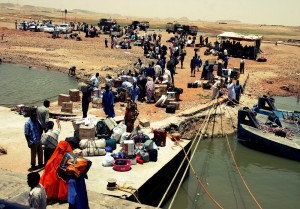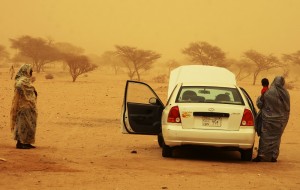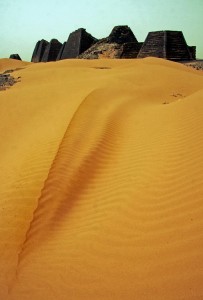Deserts, desolation and development
Amid the sweltering heat and omnipresent dust, Andrew Eatwell discovers Sudan's hospitable and friendly face – and its rapidly developing capital.
13 October 2010
“Good luck,” the Egyptian immigration official said with a wry smile as he stamped me out of Egypt at the port in Aswan, Egypt's southernmost city. I was heading for Sudan – a 20-hour ferry ride south across Lake Nasser and a place where relatively few Western travellers dare tread. Given everything you read in the international media and on Western governments' websites about Egypt's war-torn, Islamist-ruled neighbour, I felt certain at least a little luck would be needed.
My fears – and those of friends and relatives who worried I would be caught up in one of Sudan's myriad conflicts or taken hostage by Islamist extremists – proved unfounded. They started to dissipate on the ageing, overloaded passenger ferry that shuttles people and all manner of cargo once a week between the two countries. Crushed in between washing machines, satellite dishes, cutlery sets and the odd metal detector, my travelling companion, Dan, and I quickly got talking to Sudanese travellers and traders. Some were returning from visiting relatives in Egypt, some were there for business, but almost all were bringing something home with them. “Everything is too expensive in Sudan, that's why we go to Egypt,” one man told me as we sat in the shade of a lifeboat.
We spent the night in that same spot. Two white westerners – a Brit (me) and a New Zealander (Dan, friend and fellow Arabic language student from Cairo) – and a dozen Sudanese guys lying in a row, our backs on the hard, hot metal deck, our legs dangling over the edge of the ferry as the waters of Lake Nasser glided blackly passed. Every square inch of space was taken – filled with cargo or people sprawled on the open deck or on benches or the floor in the stuffy seating areas below. Going to the toilet or the canteen in the dark involved navigating an assault course of human limbs.
We both found the genuine, friendly curiosity of our fellow Sudanese passengers refreshing after months spent in Egypt where decades of mass tourism and too many touts sometimes leave you with the unpleasant feeling that the locals view every Westerner as a walking wallet.

The ferry's arrival in Wadi Halfa was as chaotic as its departure. People rushed ashore and cargo was hauled overboard onto the small concrete dock before both – almost interchangeably – were loaded onto trucks and busses for the short trip across a patch of barren wasteland to the immigration and customs offices. I was prepared for the worst: a thorough grilling by the immigration police and a full search of my backpack – Britain is not exactly on good terms with the Omar al-Bashir regime. Instead, we were waved through customs with barely a hitch. Our Sudanese visas, acquired equally painlessly at the Sudanese Embassy in Cairo for $100, were checked and the immigration officer stamped us into the country before jovially quipping: “Welcome to Alaska!” as we walked out of the warehouse-like office into near 50-degree heat.
Heat, dust and hospitality
Wadi Halfa, a few kilometres inland from the lake, proved to be a foretaste of every other Sudanese town we would visit. A few dusty streets, a dusty central square, a few dusty cafes and a couple of lokandas – cheap, basic hotels with, yes, dusty rooms and even dustier bedding. Heat and dust are the two defining elements of northern Sudan in summer – air so hot you can feel your lungs warming with every breath and dust that gets into every bodily crevice. Removing it is almost impossible, in part because water is in short supply and a shower – unless your definition of one involves a jug and bucket of brown liquid – is almost unheard of in many places.
Even at night, the heat can be unbearable and joining the locals in hauling your bed outside into the sandy courtyard of the lokanda to catch a slight breeze is often the only way to get some sleep and avoid drowning in your own sweat.

From Wadi Halfa we travelled south through the Nubian Desert to Dongola, then southeast to Karima and Atbara, tracing, as best we could, the course of the Nile and encountering progressively bigger but no less dusty, ramshackle towns. At times, amid the sand storms that frequently blew up in the afternoons, driving through vast expanses of desert, crammed into the back of a bus, car or minibus, could best be described as voyaging through the insides of a vacuum cleaner. And in that desolate desert environment, there is certainly a sense of being in a vacuum – nothing for miles, eerie silence and no signs of life, or sporadically, life that once was in the form of cattle and camel carcasses slowly decaying by the side of the road.
The fact there were paved roads at all surprised me. From the research I had done on northern Sudan, I had expected gruelling, bone-jarring journeys on dirt tracks through the desert. Instead, we encountered new black tarmac everywhere – the results, locals were only too happy to tell me, of Chinese investment in the last couple of years.
In most towns, at least as far as we could tell, we were the only Westerners and the locals were genuinely curious about why we were there. A tea or coffee – and it is good coffee! – at one of the numerous street stalls run by brightly clad women frequently resulted in long conversations with our fellow drinkers, usually in Arabic, sometimes in English, and almost always about football. More than once, however, politics came up: they asked about America, the embargo, and about the West. Some said they wanted to emigrate, others blamed the West for Sudan's problems. No one ever mentioned al-Bashir by name, nor did they want to talk about Darfur or the south. Many, a little surprisingly, said that the situation was improving, that they were struggling less now than in the past to live. In northern Sudan, at least, I came away with the impression from what I saw and heard that things were gradually getting better – though I very much doubt people in Darfur or South Sudan, which I have yet to visit, would say the same.

South of Atbara, about a third of the way to Khartoum and just off the main Khartoum-Port Sudan road, the Begrawiya pyramids rise from the desert. Built 2,500 years ago by the Meroitic Pharaohs when the area was arable and verdant, the cluster of tombs sit half-buried by the sand. Though dwarfed in scale by their more famous counterparts in Egypt, they are just as impressive in their own right – helped by the fact that they are not thronged by tourists. We were the only visitors that day and the sense of desolation and of a civilisation lost was overwhelming as we sat staring out at the bleak desert in the shadow of the ancient tombs.
Khartoum: where the rivers and cultures meet
Stuck without transport in the middle of nowhere, we managed to finally flag down a road train after a waterless hour standing in blistering heat on the side of the road. Six hours later we rolled – slowly, painfully slowly – into the Sudanese capital. After saying goodbye to the affable, talkative truck driver, a Moroccan with a Sudanese wife transporting UN food aid from Port Sudan to South Sudan, we checked into a rundown hotel near the city's main souq.
The area, like much of the capital, felt like an oversized version of every other Sudanese town we had visited, albeit livelier and more cosmopolitan. The shops bustled with activity during the day and the street cafés were alive at all hours. Along the Nile, not far from where the Blue and White Niles meet, new glass-and-steel office buildings were under construction and from the hostel window we could see a more upscale hotel: the Plaza, its rooftop sign written in Chinese.
We spent several pleasant days between central Khartoum and Omdurman, the capital's more conservative sister city on the other side of the river, wandering the streets, browsing the souq's stalls, soaking up the atmosphere over spiced coffee and fresh juices (alcohol is illegal), oh, and rediscovering the luxury of a shower.
For the first time since entering Sudan, in Khartoum I got a feeling that we were leaving the Arab world and entering sub-Saharan Africa. In the cafes, South Sudanese from different tribes sat in groups alongside Arab Sudanese from the north, Christians shopped and drank alongside Muslims. It seemed that in the more cosmopolitan, business-oriented atmosphere of the city, the divisions that have put Sudan on the world map for bloodshed and violence could easily be forgotten – perhaps too easily.
Andrew Eatwell is currently travelling through Africa. His journey has so far taken him through Sudan, Ethiopia, Kenya, Uganda and Rwanda over the last two months. He has found the experience interesting, taxing, fun, tiring, exhilarating and saddening in almost equal measure. Sudan and Ethiopia stand out as the two most intriguing countries he has visited.
This article is published here with the author's permission. ©Andy Eatwell. Please visit Andrew's website at QorreO.

Nicely done Andrew. It’s refreshing to hear another side to the story, one that’s not bloodshot with pictures of gun-toting youths or some other miserable scene.
Can’t wait to hear more.